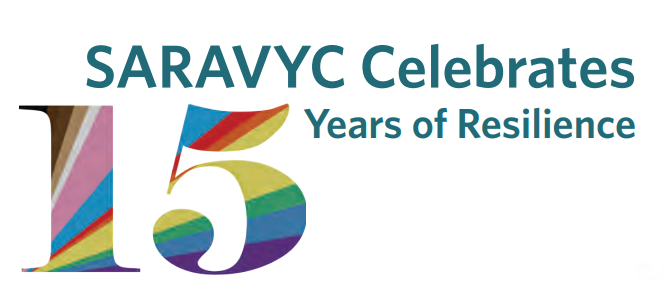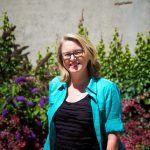15 Years of Resilience
The Stigma And Resilience Among Vulnerable Youth Centre (SARAVYC) is celebrating 15 years as a multi-disciplinary research centre this year. The results of SARAVYC’s creative research approaches have changed minds, informed legislation, generated awards, and had an impact on the lives of countless young people around the world.
In 2019 the Robert H. Durant Award for Statistical Rigor and Innovation was awarded to SARAVYC by the Society for Adolescent Health and Medicine. The award recognized the development of the SLEPHI method of evaluating population health interventions. Investigating site-level longitudinal effects of population health interventions: Gay-Straight Alliances and school safety.
SARAVYC research is quoted in HANSARD in both BC and Alberta, for example, from BC:
November 26, 2018 MOTION 33 – Sexual Orientation and Gender Identity Policies for Inclusive Education System
Collaboration: Evaluating Out in Schools (2004-2014)
- 2006: Evaluating the Minnesota Runaway Intervention Project (RIP), a nurse-led intervention which provides health care, intensive support and life skill development for young runaway girls (aged 10 to 15) who have been or were at risk of being sexually assaulted or sexually exploited.
- 2011: Best Poster Award for Childhood Sexual Abuse, Substance Use and Substance Use-Related Sexual Behaviour in a Rural School Population.
- 2014: SARAVYC conducts a bilingual survey to learn about the health of 923 transgender youth in Canada. It is the first and largest of its kind in the country. The survey is repeated in 2019, with 1,519 trans and/or non-binary youth across the nation responding.
- 2015: Invited to the White House (Obama Administration) for Bisexual Community Policy Briefing.
- 2016: “Enacted stigma and HIV risk behaviours among sexual minority Indigenous youth in Canada, New Zealand, and the United States” is published. It is a project with Indigenous investigators from all three countries.
- 2017: Infographic is released to disseminate knowledge about school-based interventions that benefit all students.
- 2018: The Trans Youth Hormone Therapy Decision Making Study is conducted by Dr. Beth Clark, a PhD candidate at the time. The study explores how trans youth and their parents make decisions about initiating hormone therapy. Results are disseminated through a youth-driven, creative arts-based knowledge translation project.
- 2019: Along with poetry, journals, and paintings, this board game is designed and further developed to help health care providers understand the barriers trans youth experience when they are trying to access hormone therapy.
- 2019-2021: The World Health Organization (WHO) taps SARAVYC for urgent support developing a survey for a global guideline on school health services. The Guidelines Development Group (GDG) was chaired by Elizabeth Saewyc.
Inquiring Minds: Where Are They Now?
Dr. Brittany Bingham worked in a leadership role with the Raven’s Children II and and Moving Upstream: Aboriginal Marginalized and Street-Involved Youth in BC Reports. Brittany is currently leading Indigenous research strategy and initiatives at both VCH Indigenous Health and CHSHE.
Claire Bitcher, MSN, RN whose Master’s thesis was “Homeless and Street-Involved Youth Access to Primary Health Care Services: What Helps and What Gets in the Way?” is now the Integration and Access Lead at Vancouver Coastal Health Child and Youth Mental Health.
Dr. Jones Adjei published “Boys are not Exempt: Sexual Exploitation of Adolescents in Sub-Saharan Africa” in Child Abuse & Neglect in 2017. He is a statistician and an instructor in the Department of Humanities and Social Sciences, Red Deer College, Alberta.
Dr. Jennifer Wolowic is applying her years of experience as former Managing Director at SARAVYC to her current role as the project manager for the Strengthening Canadian Democracy Initiative at the Morris J. Wosk Centre for Dialogue at Simon Fraser University.
Dr. Yuko Homma was a doctoral student and post-doctoral fellow with SARAVYC from 2007 to 2014. She is now faculty at Mukogawa Women’s University in Nishinomiya, Japan as Associate Professor.



